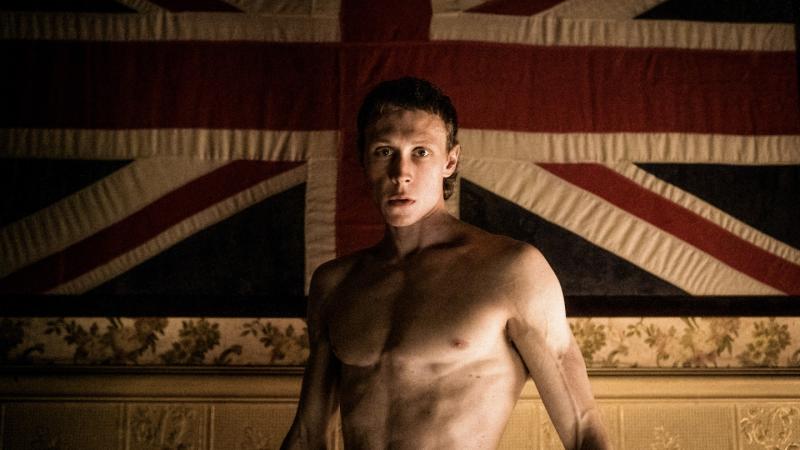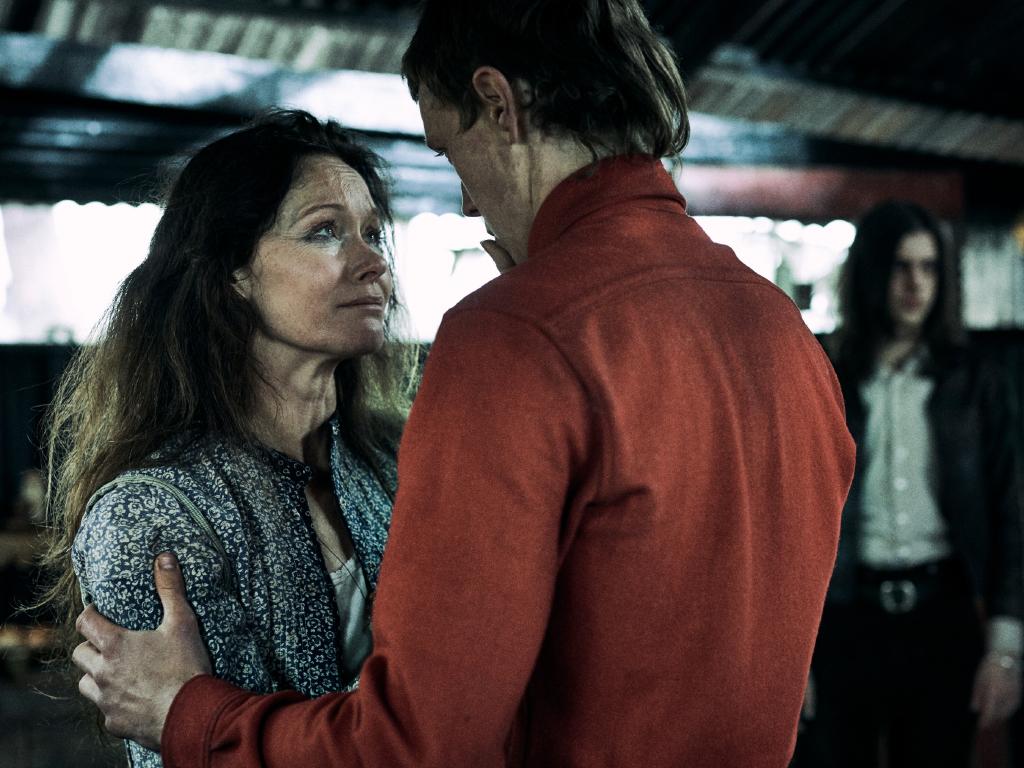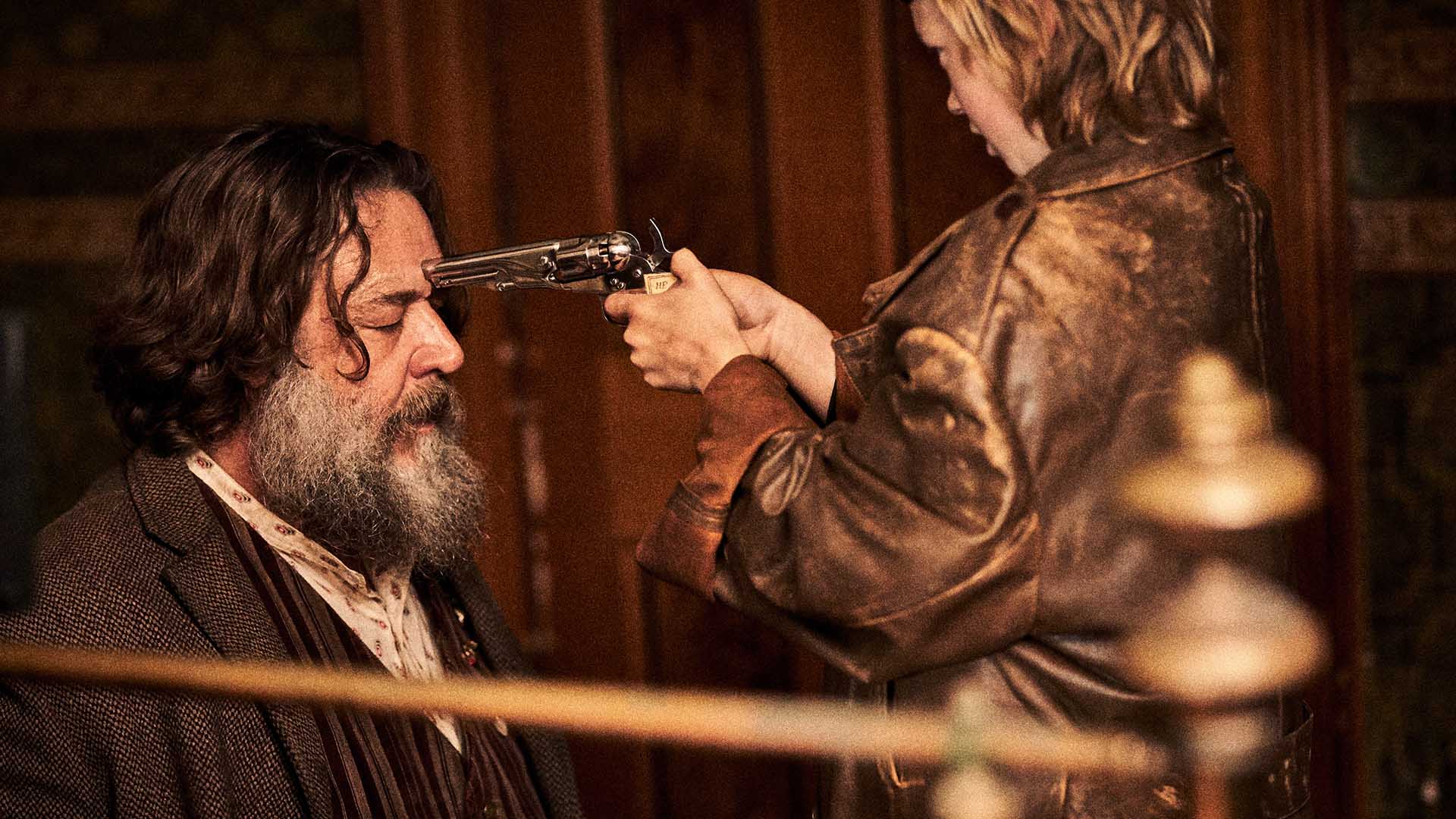True History of the Kelly Gang review - anarchy in Oz | reviews, news & interviews
True History of the Kelly Gang review - anarchy in Oz
True History of the Kelly Gang review - anarchy in Oz
Australia's outlaw myth reimagined as feverish satire

“Nothing you’re about to see is true,” this adaptation of Peter Carey’s novel about Australia’s iron-clad Victorian outlaw Ned Kelly declares.
Kelly grows up in an impoverished, outback Irish family led by necessarily feral mother Ellen (The Babadook’s Essie Davis, pictured below left). This maternal Lady Macbeth is glamorous, cunning, hopelessly defiant and fearsomely vicious. First recalled by Ned pragmatically giving a blowjob to the local policeman, she later violently drives her husband from the house for drunken brutishness, before police mistreatment leads to his death. Her pride buoys Ned and dooms him, when she spurns a chance of tainted English education. He’s instead schooled in savage possibilities by cultured killer Harry Power (Russell Crowe, pictured bottom left) and the grim attentions of the English-born police. Played by pale, blond Orlando Schwerdt as a malleable, watchful boy, George Mackay’s bony face and untrusting eyes retain that wrecked child in adulthood, only as a last desperate act becoming the fearsome criminal of legend.
 Kurzel’s Snowtown almost unwatchably confronted the reality of a serial killer, in an Adelaide suburb so lost this made him a male role model. He’s more antic and picturesque here, favouring candlelit glows in the country dark and blasted skeleton trees, and playing fast and loose with narrative and tone. Brother Jed Kurzel streaks his supple score with electric guitars, making Ned the explicit precursor to Johnny Rotten’s London Irish anarchy. The humour is equally raucous. “Are there no men of substance left in this country?” Ma Kelly cries rhetorically when Ned fails to shoot their police nemesis Fitzgerald. Vivid satire vies with history, cartoonish vigour with real pain. Though convincingly oily as Fitzgerald, Nicholas Hoult falls shorter than fellow Englishman Mackay in inhabiting this slippery mode.
Kurzel’s Snowtown almost unwatchably confronted the reality of a serial killer, in an Adelaide suburb so lost this made him a male role model. He’s more antic and picturesque here, favouring candlelit glows in the country dark and blasted skeleton trees, and playing fast and loose with narrative and tone. Brother Jed Kurzel streaks his supple score with electric guitars, making Ned the explicit precursor to Johnny Rotten’s London Irish anarchy. The humour is equally raucous. “Are there no men of substance left in this country?” Ma Kelly cries rhetorically when Ned fails to shoot their police nemesis Fitzgerald. Vivid satire vies with history, cartoonish vigour with real pain. Though convincingly oily as Fitzgerald, Nicholas Hoult falls shorter than fellow Englishman Mackay in inhabiting this slippery mode.
Kurzel again examines bloodied male bodies and their equally wounded psyches, as Ned engages in bare-chested, bare-knuckle boxing, lolls with the near-nude Fitzgerald in a brothel, and continues a family tradition of cross-dressing thievery. His narration, partly drawn from the real Ned’s affronted, grandiose manifestos, desires independence from this brute existence, declaring: “Every man should be an author of his own history.” His invented, ex-prostitute wife (Thomasin McKenzie) is contrastingly cowed and quiet.
 The final shootout, in which Ned dons the armour he dreamed would make him battleship-impregnable, is a feverish episode, all sweat, fire and terror, with the besieging police lined up through his visor like arcade game targets, and white-cloaked like the Klan. Kurzel aspires to this heightened, hallucinatory condition in response to a landscape of primeval hostility worsened by its inhabitants, who seem already to have erased its original people. Civilised redoubts, from whorehouses to lecture halls, seem phantasmal by contrast.
The final shootout, in which Ned dons the armour he dreamed would make him battleship-impregnable, is a feverish episode, all sweat, fire and terror, with the besieging police lined up through his visor like arcade game targets, and white-cloaked like the Klan. Kurzel aspires to this heightened, hallucinatory condition in response to a landscape of primeval hostility worsened by its inhabitants, who seem already to have erased its original people. Civilised redoubts, from whorehouses to lecture halls, seem phantasmal by contrast.
Like John Ford’s The Man Who Shot Liberty Valance crossed with the ur-Okker masterpiece Wake in Fright (1970), this is a Western about a nation’s chosen history, in which Kelly remains a maggoty immortal, eating away at respect for authority. Kurzel’s portrait of a wild colonial land where even stories are stolen is awfully convincing.
rating
Explore topics
Share this article
The future of Arts Journalism
You can stop theartsdesk.com closing!
We urgently need financing to survive. Our fundraising drive has thus far raised £49,000 but we need to reach £100,000 or we will be forced to close. Please contribute here: https://gofund.me/c3f6033d
And if you can forward this information to anyone who might assist, we’d be grateful.

Subscribe to theartsdesk.com
Thank you for continuing to read our work on theartsdesk.com. For unlimited access to every article in its entirety, including our archive of more than 15,000 pieces, we're asking for £5 per month or £40 per year. We feel it's a very good deal, and hope you do too.
To take a subscription now simply click here.
And if you're looking for that extra gift for a friend or family member, why not treat them to a theartsdesk.com gift subscription?
more Film
 Iron Ladies review - working-class heroines of the Miners' Strike
Documentary salutes the staunch women who fought Thatcher's pit closures
Iron Ladies review - working-class heroines of the Miners' Strike
Documentary salutes the staunch women who fought Thatcher's pit closures
 Blu-ray: The Man in the White Suit
Ealing Studios' prescient black comedy, as sharp as ever
Blu-ray: The Man in the White Suit
Ealing Studios' prescient black comedy, as sharp as ever
 The Woman in Cabin 10 review - Scandi noir meets Agatha Christie on a superyacht
Reason goes overboard on a seagoing mystery thriller
The Woman in Cabin 10 review - Scandi noir meets Agatha Christie on a superyacht
Reason goes overboard on a seagoing mystery thriller
 London Film Festival 2025 - crime, punishment, pop stars and shrinks
Daniel Craig investigates, Jodie Foster speaks French and Colin Farrell has a gambling habit
London Film Festival 2025 - crime, punishment, pop stars and shrinks
Daniel Craig investigates, Jodie Foster speaks French and Colin Farrell has a gambling habit
 I Swear review - taking stock of Tourette's
A sharp and moving tale of cuss-words and tics
I Swear review - taking stock of Tourette's
A sharp and moving tale of cuss-words and tics
 A House of Dynamite review - the final countdown
Kathryn Bigelow's cautionary tale sets the nuclear clock ticking again
A House of Dynamite review - the final countdown
Kathryn Bigelow's cautionary tale sets the nuclear clock ticking again
 theartsdesk Q&A: Idris Elba on playing a US President faced with a missile crisis in 'A House of Dynamite'
The star talks about Presidential decision-making when millions of lives are imperilled
theartsdesk Q&A: Idris Elba on playing a US President faced with a missile crisis in 'A House of Dynamite'
The star talks about Presidential decision-making when millions of lives are imperilled
 Urchin review - superb homeless drama
Frank Dillane gives a star-making turn in Harris Dickinson’s impressive directorial debut
Urchin review - superb homeless drama
Frank Dillane gives a star-making turn in Harris Dickinson’s impressive directorial debut
 Mr Blake at Your Service review - John Malkovich in unlikely role as an English butler
Weird comedy directed by novelist Gilles Legardinier
Mr Blake at Your Service review - John Malkovich in unlikely role as an English butler
Weird comedy directed by novelist Gilles Legardinier
 Don't Let's Go to the Dogs Tonight review - vivid adaptation of a memoir about a Rhodesian childhood
Embeth Davidtz delivers an impressive directing debut and an exceptional child star
Don't Let's Go to the Dogs Tonight review - vivid adaptation of a memoir about a Rhodesian childhood
Embeth Davidtz delivers an impressive directing debut and an exceptional child star
 One Battle After Another review - Paul Thomas Anderson satirises America's culture wars
Leonardo DiCaprio, Teyana Taylor, and Sean Penn star in a rollercoasting political thriller
One Battle After Another review - Paul Thomas Anderson satirises America's culture wars
Leonardo DiCaprio, Teyana Taylor, and Sean Penn star in a rollercoasting political thriller

Add comment